About Dental Implants
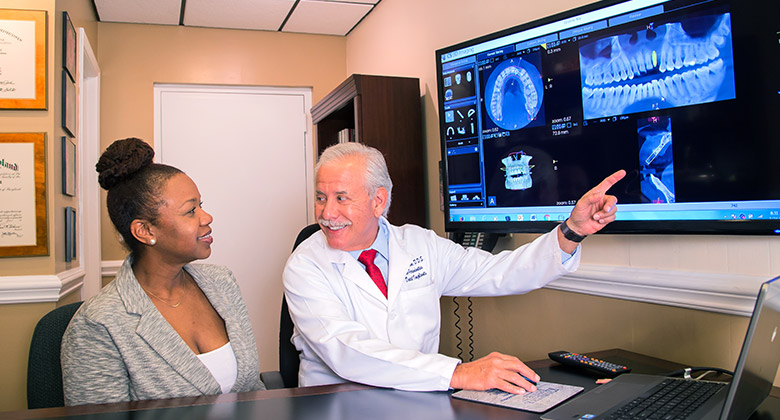
Dr. Levine will explain your implant treatment in detail and answer any questions you may have.
The Most Durable and Lifelike Solution for Missing Teeth
- The Benefits and Advantages of Dental Implants
- Who Are Candidates for Dental Implants?
- Dental Implants Compared to Dental Bridges
- The Problems with Dentures as Replacement Teeth
Dental implants are the strongest, longest-lasting and most lifelike replacement option for missing teeth. They feel and function just like natural teeth and with proper care can last a lifetime. When it comes to tooth replacement, Dr. Levine recommends dental implants as the preferred choice for all patients who are eligible to receive them.
What is a Dental Implant?
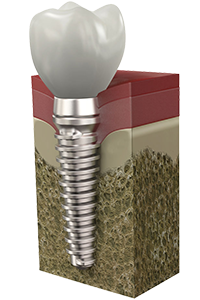 A dental implant is a titanium post that is inserted into the jawbone to function as a replacement tooth root for a missing tooth. A connecting piece, called an abutment, is placed on top of the implant and serves as the attachment point for a dental crown, a bridge or a denture.
A dental implant is a titanium post that is inserted into the jawbone to function as a replacement tooth root for a missing tooth. A connecting piece, called an abutment, is placed on top of the implant and serves as the attachment point for a dental crown, a bridge or a denture.
After the implant is placed, the surrounding jawbone cells grow around and completely integrate with the surfaces of the implant. When the implant has fully healed and integrated, it is firmly anchored in the jaw and is as strong as a natural, healthy tooth root.
The Benefits and Advantages of Dental Implants
Dental implants have many unique benefits and advantages that make them superior to any other tooth replacement option:
- Dental implants function just like regular tooth roots. They make your dental restorations function just like natural teeth. Most people cannot tell the difference between their implant-supported replacement teeth and their natural teeth.
- Dental implant-supported teeth have the same biting and chewing power as natural teeth. This allows you to eat all the foods you want and need for full nutrition.
- Implant-supported teeth do not require grinding down and weakening adjacent teeth, as is necessary with a dental bridge.
- Dental implants provide the chewing pressure required to maintain the volume and density of bone in your jaw. Without this pressure, the jawbone gradually dissolves. If you are missing many or all of your teeth, the lower third of your face can eventually get a “collapsed” look.
- Implant-supported dentures are held firmly in place and do not need adhesives. They provide greatly enhanced chewing power.
Who Are Candidates for Dental Implants?
Due to advances in dental implant technology, most people can now successfully receive dental implants. In the past, patients with too much bone loss around their missing teeth could not receive implants, as implants need a certain amount of bone support to be stable. We use modern bone grafting techniques to restore bone and provide needed support for implants. When performing full-arch tooth replacement, Dr. Levine is usually able to provide stable replacement teeth without the need for bone grafting.
Even patients with health complications, that formerly made implant placement too risky, are now candidates. This includes patients with medical issues such as diabetes, cardiovascular disease, and who smoke heavily. Dr. Levine will work directly with your physician to make sure a compromised health situation does not prevent successful implant placement.
There are no age limits on who can receive dental implants, except for patients who are so young that their jaw structures have not yet fully developed.
Minimally Invasive Dental Implant Placement
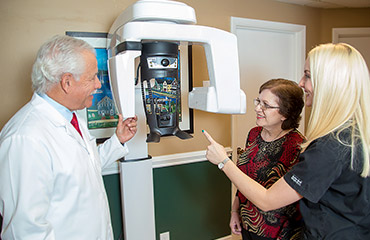
We use our advanced 3D CT scanner to obtain detailed, three-dimensional images of your mouth.
We use state-of-the-art technology to make your dental implant placement minimally invasive, efficient and comfortable.
With digital X-rays, high-resolution 3D images of your mouth and special implant planning software, the doctor precisely maps out the best angle and position for each implant. He also plans any necessary bone grafting. A surgical guide is sometimes also used to make implant placement more efficient, such as when placing a number of implants at the same time.
Dr. Levine uses low-level laser therapy to accelerate healing and reduce postoperative discomfort. During the healing phase, he utilizes a high-tech implant stability meter to determine when an implant is stable enough to safely support a dental restoration.
Learn more about our dental implant treatment here.
Dental Implants Compared to Dental Bridges
 Dental bridges are one of the traditional methods of replacing a missing tooth, but they have several disadvantages. For a dental bridge to be placed, the teeth adjacent to the missing tooth have to be ground down. This weakens those teeth and can lead to decay, fracture or other future complications. Additionally, dental bridges have an average life span of only seven to ten years.
Dental bridges are one of the traditional methods of replacing a missing tooth, but they have several disadvantages. For a dental bridge to be placed, the teeth adjacent to the missing tooth have to be ground down. This weakens those teeth and can lead to decay, fracture or other future complications. Additionally, dental bridges have an average life span of only seven to ten years.
Dental Implants do not require the grinding down of adjacent teeth. A dental implant-supported tooth transmits the chewing pressure into the jaw, which stimulates and maintains bone volume. Dental bridges cannot stimulate the underlying bone. Dental implants, if properly cared for, can last a lifetime.
The Problems with Dentures as Replacement Teeth
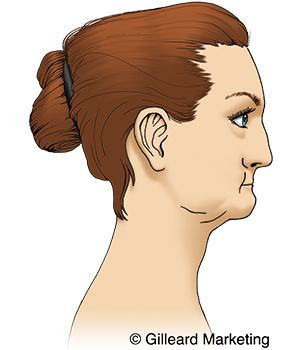 The jawbone supporting the teeth needs biting and chewing pressure on the tooth roots in order to maintain its volume and density. When teeth are lost, this pressure is absent, and the jawbone around missing teeth gradually dissolves. When all teeth are missing, the entire jaw loses height and thickness.
The jawbone supporting the teeth needs biting and chewing pressure on the tooth roots in order to maintain its volume and density. When teeth are lost, this pressure is absent, and the jawbone around missing teeth gradually dissolves. When all teeth are missing, the entire jaw loses height and thickness.
Traditional dentures do not provide the type of pressure needed to maintain the bone volume in your jaw. The pressure placed on the jaw by dentures actually accelerates bone loss and facial sagging. This is why denture wearers tend to develop wrinkles around their mouths, a pointed chin and a prematurely aged appearance.
The disadvantages of dentures
Traditional dentures have numerous other disadvantages that make them the least desirable replacement option for missing teeth:
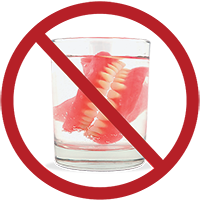
- Dentures only provide between 10 to 20 percent of the chewing power of natural teeth. This makes it difficult or impossible to eat many of the foods needed for proper nutrition without resorting to a blender.
- Dentures often make awkward noises or move around while you eat or talk.
- Dentures usually need messy adhesives to hold them in place.
- Dentures often slip while chewing, which can lead to painful sores on your gums.
- Dentures for upper teeth have a false palate that covers the roof of your mouth. This blocks your sense of taste and blocks your perception of heat and cold when you eat and drink.
- Dentures have to be regularly refitted due to the shrinking of the jawbone caused by missing teeth. This can get to a point where no denture will fit properly anymore.
Implant-Supported Dentures Increase Chewing Power and Stability
Dental implants can be used to support a denture and anchor it stably in your mouth. This creates a strong foundation for the denture and significantly increases chewing power. The chewing pressure placed on the implants also stimulates the jawbone underneath and helps maintain bone volume, thus preventing the “collapsed” look of the face that comes from wearing traditional dentures.
Depending on your needs and preferences, Dr. Levine can provide both fixed and removable implant-supported dentures. Both types are durable, aesthetic and natural-looking, and provide greatly enhanced chewing power. Fixed implant-supported dentures are the most lifelike option, and they provide nearly the full chewing power of natural teeth.
Learn more about our implant-supported dentures here.
To make an appointment, call 954‑722‑1100 or click here to request an appointment online.
